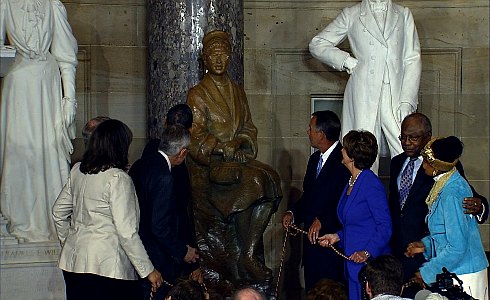
“I was tired of giving in.”
– Rosa Parks
It is always interesting to reflect on certain events that took place in days gone by, especially when it comes to economic issues. In my entrepreneurship classes, I often use the example of the Montgomery bus boycott to illustrate a very important lesson we could (and should) take from those strong, dedicated, and committed brothers and sisters who walked until their demands were met. Some 42,000 bus riders walked to work for 381 days. Not only was their action exemplary and admirable, it also offers a very important lesson in economic empowerment.
Here’s what I mean. Let’s assume the bus fare in Montgomery at that time was 20 cents roundtrip. We know the bus boycott lasted for 381 days. Multiply 20 cents times 381 times 42,000. The answer: $3,200,400. How many buses do you think could have been purchased with that amount of money in 1956 when the boycott ended? Do you think the people could have bought a factory and produced seats, or tires, or signs for those buses? How about opening a maintenance facility to service the buses? Get the picture? Do you see the lesson?
Suppose those who walked to work had put their bus fare into a common fund every day as sort of a savings account for Black folks. If they had done that, in addition to withholding their money from the bus company, they would have had $3,200,400. In 1956 that was a great deal of money and could have created great economic change.
While there are many other lessons we can learn from and take advantage of today, the Montgomery issue stands out because of a story I read in the Toledo Journal many years ago titled, “Restored Rosa Parks Bus heads for new home.” As I read it, I could not help but think about the above-mentioned numbers because the article cited the purchase of the bus by the Henry Ford Museum in Dearborn, Mich.
The bus was found in a field, rusted and riddled with bullet holes. The museum paid $492,000 for it and spent $300,000 more for its restoration. With $3.2 million, not only could the bus boycotters have bought a fleet of Black-owned buses, they could have also bought the Rosa Parks Bus. Do you see the irony here? Do you see the lesson? Now if you want to see that bus, you’ll have to pay an admission fee to the museum. It’s like I always say, “Many of us prefer symbolism over substance.”
Even though our “leaders” have waited nearly 50 years to tell us that economic empowerment is what we must seek and fight for, it is vital that we take our lessons whenever and wherever we can find them. We must remember that things always boil down to economics in some form or fashion.
I don’t know about you, but I think we would be much better off today if we owned a few bus companies, the way Blacks did with the Safe Bus Company in Winston-Salem, N.C. rather than having to pay to ride on someone else’s. I think Rosa Parks would have been happier and would rest easier if, for instance, Black people manufactured and owned the school buses our children have been riding for decades.
I would much rather go to Detroit and ride a Black-owned bus than to go to a museum and pay to see the bus that Rosa Parks and others rode in 1955. It may be a piece of history, but it’s still just a bus, an inanimate object that played nothing more than a passive role in what we now call our struggle for equality. Someone made a few hundred thousand dollars from the sale of the bus. Someone else made another $300,000 to restore it. And the museum continues to make who knows how much because people want to see it, to board it, to touch it, and to actually sit in the same seat in which Rosa Parks sat. As Don King says, “Only in America!”
I appreciate the willing spirit of those who sacrificed, walked, fought, and subjected themselves to the Bull Connors of this nation. It would be a tribute to them if we would use their lessons to economically empower ourselves. Celebration and nostalgia are fine, but what we need now are ownership and control of income-producing assets, such as buses, museums, supermarkets, hotels, and gas stations.
Is anybody out there willing to start an equity/investment fund? Is anybody out there ready to put some money into it? Is anybody out there willing to support the businesses developed by such an effort? Or, are we satisfied with simply making others wealthy by spending our way into economic oblivion? I don’t think Rosa Parks would want us to do that. She was tired of giving in, so she defied the status quo. Are we tired enough to make a similar change in our economic behavior?
Jim Clingman, founder of the Greater Cincinnati African American Chamber of Commerce, is the nation’s most prolific writer on economic empowerment for Black people. He is an adjunct professor at the University of Cincinnati and can be reached through his Web site, blackonomics.com.
